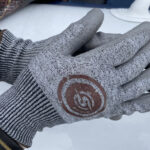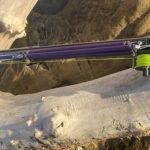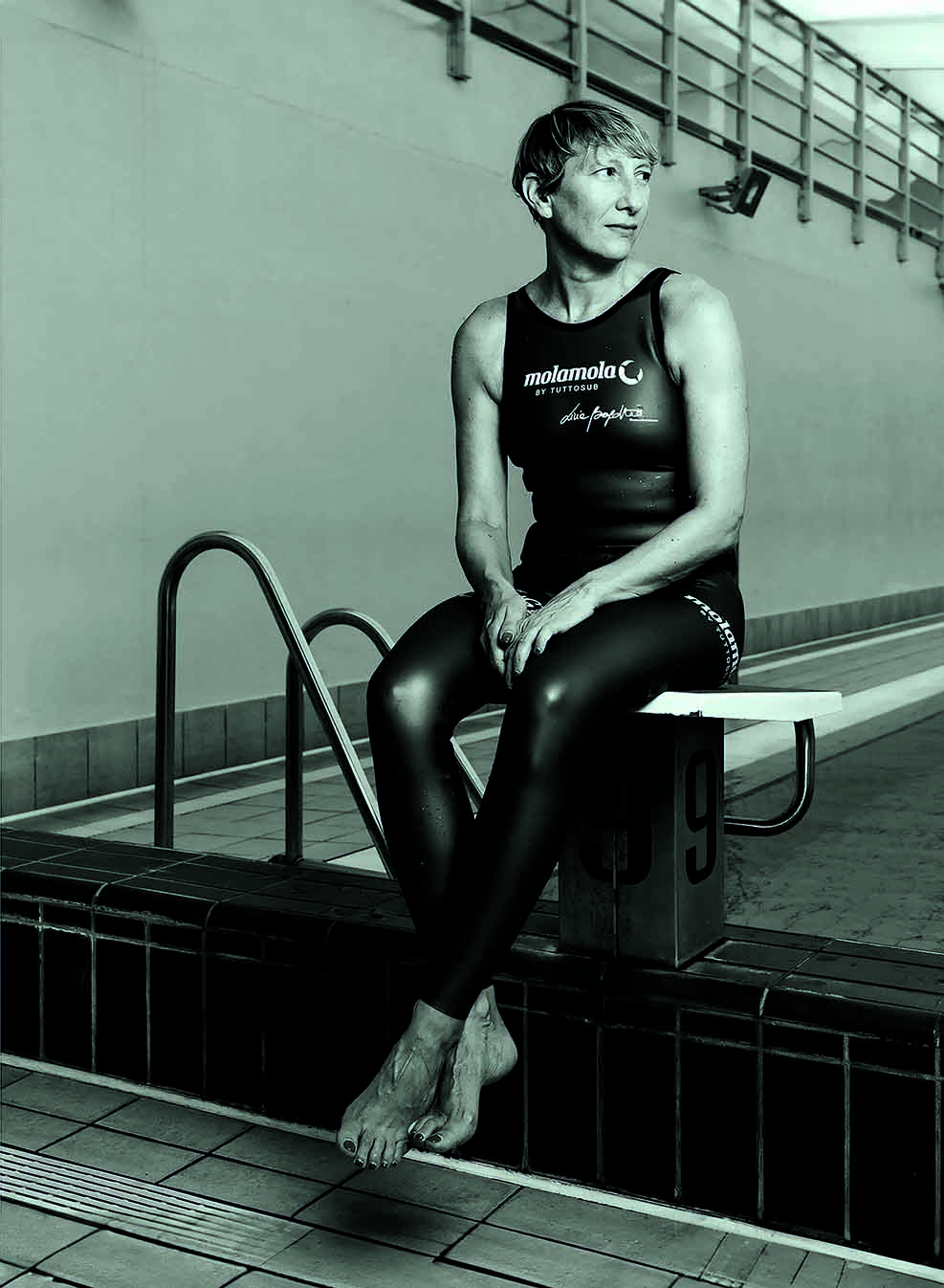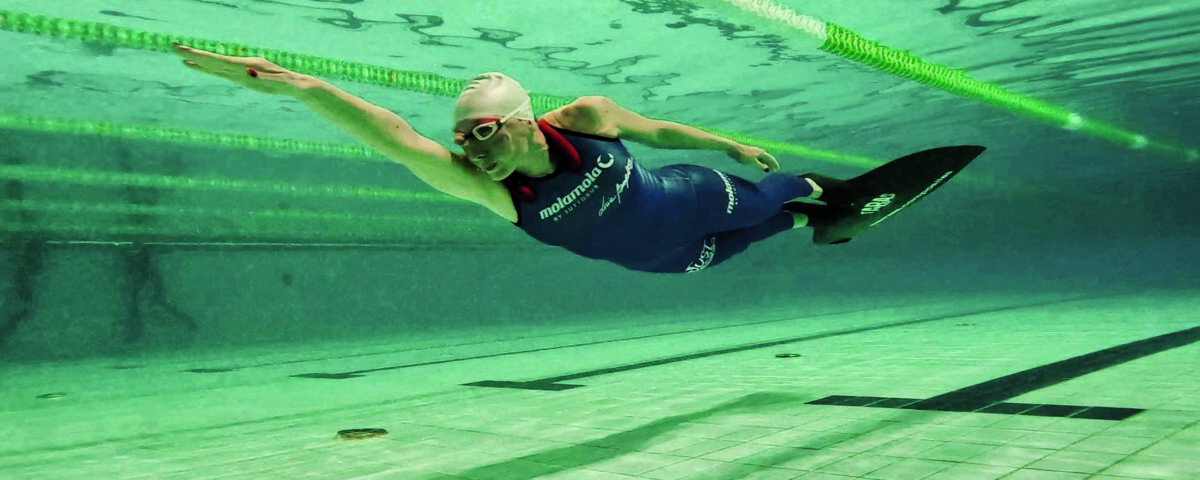A Chat with Livia Bregonzio

Sigal: Shield Glove
24 November 2023
Sigalsub: the new Nemesis HT Aluminum Inverter
4 December 2023Between world and national records, she has firmly entered the realm of indoor freediving. When did she start, and how did she get into competitive freediving
Filippo Carletti
"I started doing freediving purely by chance," she replied. "I didn't even know that indoor disciplines existed, and, for me, that was a unique period. I used to swim in the pool where I still train today, in Sesto Calende. Right there, there was a sign talking about freediving. I think I passed by it for about six months. Then, winter came, and I convinced myself to go to the trial lesson. The instructor showed a video of an athlete using a monofin, and I fell in love with it. I was fascinated by the incredible distances that could be covered underwater and the exit protocol. I decided that I wanted to try it. I still remember when he brought the monofins for us to try. I literally jumped in, and by the second lesson, I was already swimming 50 meters, and that's when I also started with competitions. After two months, I went to the Italian Championships, collecting my first 2 gold medals. From there, I never stopped. I think I am predisposed for this sport, but training is crucial. I started when I was 41, and I believe that was the right time for me to succeed in what I did. Records come only when and if you seek your limits; there must be a deep inner drive, a desire to push beyond. Ultimately, what I am truly proud of and carry with me is not the numbers, but the journey I've made to get there. That is my greatest satisfaction.
"This year has been very successful; among the goals I achieved is an absolute short course fin swimming record (meaning it's a record that can also be beaten by men). At the World Championships in Belgrade, I won a bronze medal and set an Italian record in the long course, which was later broken in 2023 during the World Championships in Kuwait, where I also won the title of vice world champion in two fins and a bronze in monofin, along with 3 World Record Master50 in the three dynamic disciplines".
How do you manage to swim over 200 meters underwater? Can anyone achieve it?
"It's definitely not simple. It's a mix of various factors. To achieve such results, discipline, consistency, and method are essential. You need a good training program that considers every variable and aspect, not just the time spent in the water. Nutrition is crucial, knowing precisely what to eat and when to eat it, taking into account how much energy you expend, how you replenish it, and the recovery time needed. Loading and unloading phases are also crucial. And, of course, all of these aspects must work together”.
"I train in the water about 2 times a week, never exceeding 130 meters. As the competitions approach, I start increasing the distances, up to 70 percent of the total, to test my preparedness. Mental energy plays a significant role in freediving, especially in a 250-meter performance with a monofin; the mental aspect makes the difference. For me, the method is everything. Knowing how to listen to yourself, understanding what you are doing, and being in control at all times".
Is freediving growing in Italy? How has it changed over the years?
"Freediving has certainly changed a lot, starting with the equipment. When I began, people would simply use what they had, sometimes homemade gear. The equipment available today is vastly superior. This change occurred in just nine years. Today, we have fins, monofins, neck weights, wetsuits, and much more that are incredibly more efficient. Additionally, there are clubs that have made history with structured programs to train athletes, from the young to the elderly, raising the level of every type of physique and person. The sports association 'Sottopressione' is currently the strongest in Italy, and this year, it reaped the rewards of its hard work. The world of competition has also changed. The competition level has risen, and when you enter the water, it's a fierce battle. We compete not just for results but for the work of an entire year".
How do you train for results like yours? What is your daily routine like?
"I train 6 days a week. It's very demanding because, in addition to water training, there's dryland work, which is crucial. The preparation never ends. Consider the mental preparation, a continuous flow in which you focus on yourself. I do a lot of breathing exercises, often with external aids and sports coaching. Setting goals beyond what you can currently achieve can be challenging; making it through 200 meters every time isn't easy, even though it's within my capabilities. In a season, you work continuously for those 3 minutes of competition. You need to calculate everything: your expectations and those of others, anxiety, unexpected events, and stress. These aspects are also part of the training”.
In a stage with Pavia Apnea, you talked about the self-talking technique, which you said you often use. What does it mean?
"I use that technique a lot, especially to motivate myself. I find it very useful to talk to myself continuously, to listen and understand. During a dynamic freedive, you should never think about the final distance; if you do, it's already over. The performance should be built piece by piece, meter by meter, enjoying it from the start and rewarding yourself for positive sensations. Naturally, there comes a more challenging phase, but it's important to hold on, knowing that it will get better and that the stress is just a peak. After that, the phase I like the most begins, the hypoxic phase. It's like a vertigo; the risk is losing contact with reality and your own body while you must remain vigilant. It's a risky and beautiful sensation. That's why continuous self-talk is essential".
I've seen that you have dedicated yourself to depth diving through your social media. What's the connection between dynamic freediving and deep diving?
"They are two completely different things. Dynamic freediving is all about control, while deep diving is about letting go. My initial difficulties were because I was 'facing' deep diving, and even that term is wrong! Today, it's much better for me, beyond the equalization, which is fundamental. Now, switch diving is much easier for me".
Is the freediving community tight-knit in Italy? Do you have friends and companions in this world?
"In competition, there's only competition, especially at international levels, but also among Italians. However, the freediving community does exist and is close-knit. I believe we are all part of the same large group, sharing the same experience of extreme well-being in the water, and we resonate with each other when we are close, all because of what the water offers to each of us".
Projects and internships?
«For a year I have been following some athletes. It's a demanding job because I work alongside it with my activity as a competitor, so I try to do it by offering the highest quality, and it's a source of great satisfaction. I have several projects and requests for the 23-24 season and on a competitive level I am thinking about preparing the qualifications for the World Games, in China, in 2025; they will be held at the World Indoor Championships in Belgrade in the first week of July 2024. I'm also thinking of stopping, but it's a very challenging goal and I might decide to prepare for them."
Any advice for anyone wanting to start, even just out of passion?
«I love this discipline, it helps us understand who we are, it offers us a different vision of ourselves in another environment. Underwater there are different conditions, we behave differently and consequently we are more open towards ourselves. I jumped into the water by pure chance, and it turned out to be a beautiful adventure. They say don't stay in your comfort zone or rather I would say just experiment with other things. In the water you can find and experience a new self and a new point of view, completely different from what you are used to. And it's fascinating!».
Photo Fabio Bonanno



